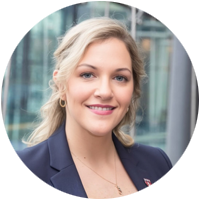Samantha Leonard, MD, FACS | Surgical Leadership

Samantha Leonard, MD, FACS, is a general surgeon specializing in breast and colon oncology. Passionate about rural medicine, Leonard serves as chief of surgery and oversees all surgical departments and clinics at Essentia Health-Moose Lake in northern Minnesota. Leveraging the skills and knowledge gained from the Surgical Leadership program at Harvard Medical School, she developed a multidisciplinary breast cancer program to address a pressing health care need in her rural community.
Embracing Leadership Challenges
Leonard initially joined the HMS Surgical Leadership program to enhance her leadership capabilities, knowing that she would take on more leadership and administrative roles in the future. “This program truly taught the fundamentals of leadership and how it applies to surgeons,” she says. “It bridged that gap phenomenally.”
After enrolling, she found herself in the middle of an unexpected career transition into chief of surgery at a new hospital. Having initially considered options such as pursuing a Master of Science or an MBA, Leonard discovered that the Surgical Leadership program offered a unique blend of leadership development that resonated deeply with her aspirations as a surgeon.
“While in the Surgical Leadership program, I was also growing my practice in a very new facility, so I was able to implement leadership techniques that I was learning in real time. I could show up differently as a leader with all these tools that I learned from the program,” she notes.
Global Connections: Networking and Learning Across Borders
The Surgical Leadership program provides a unique opportunity to connect with surgeons from diverse backgrounds, spanning over 30 countries. The global network of peers offered invaluable insights and perspectives on the challenges and opportunities facing surgical leaders worldwide.
“There’s nowhere in the world where you would get a similar experience with surgeons across such a multitude of specialties and countries. We’re all there to develop our leadership skills and commit to being better leaders in surgery. I used that opportunity to meet as many people as possible, get to know them, and understand what they do.”
In the process, Leonard learned so much about the multidisciplinary challenges in surgery. “It doesn’t matter if you’re in ophthalmology in Kenya or orthopedic surgery in Tanzania, we all have very similar challenges as leaders in surgery. It was just so awesome to get that networking experience and develop those partnerships that I’m going to keep forever.”
Bridging Theory and Practice
One curriculum highlight was the capstone project, where Leonard had the opportunity to develop a multidisciplinary breast cancer program. In her new role as chief of surgery at a rural hospital, she immediately saw an opportunity to better serve patients and expand coverage to the entire region. “I love taking care of breast cancer patients. It’s a passion of mine to be able to provide that service to rural communities.”
Through the capstone, Leonard learned how to structure the whole program and how to propose certain elements in an intentional way. “The project helped me complete the whole process in a third of the time it would have otherwise taken me. Within six months of completing the capstone, I was able to implement the program successfully and provide comprehensive care to breast cancer patients in our region.”
She emphasizes that the Surgical Leadership program is designed to accommodate even the busiest of schedules, as exemplified by her own experience. Despite undergoing a significant career change, juggling responsibilities as a parent to three young children, and relocating across state lines, Leonard was able to be fully immersed and benefit from the program.
Whether surgeons are just beginning to explore leadership roles and seek fundamental skills for success or are seasoned veterans with decades of leadership experience, they will find valuable insights. “There is so much power in learning about being a more effective leader,” she asserts. “And it doesn’t matter where you sit on that career path. There is something for everybody in the program.”